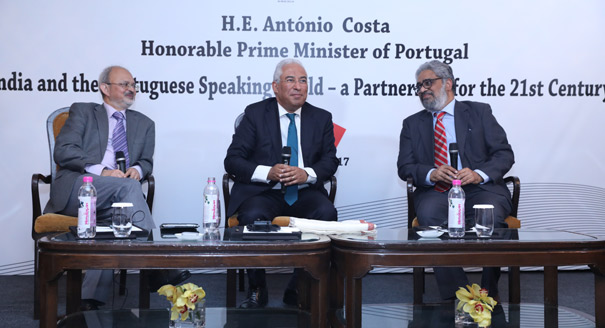Registration
You will receive an email confirming your registration.
Carnegie India and the Observer Research Foundation, in collaboration with the Embassy of Portugal, hosted a special address by H.E. Mr. Antonio Costa, the honorable prime minister of Portugal. The address was followed by a panel discussion on the prospects for Indo-Lusophone economic and security cooperation with H.E. Mr. Augusto Santos Silva, the Portuguese minister of foreign affairs, H.E. Mr. Manuel Caldeira Cabral, the Portuguese minister of economy, Ambassador Rengaraj Viswanathan, the former consul general in Sao Paulo, and Dr. Constantino Xavier, a fellow at Carnegie India.
In the backdrop of the Portuguese prime minister’s six-day visit to India and the opportunity it presents to deepen the relationship between both countries, participants discussed potential areas for bilateral cooperation as well as the possibility of trilateral cooperation, with Portugal acting as a bridge to the Lusophone (Portuguese-speaking) world.
DISCUSSION HIGHLIGHTS
- New Impetus to Historical Ties: While the Indo-Portuguese relationship traces back to Portuguese arrival in India more than five hundred years ago, discussants said, in the postcolonial period, diplomatic ties were only established in 1974-75. The relationship has progressed tremendously politically and culturally since then, but panelists indicated that the its economic and strategic potential has not been fully realized. Given the tensions currently straining the European Union, worries about American commitment to NATO, and India’s concerns about China, participants agreed that both countries are looking for new partners, with India looking west and Portugal looking south. Portuguese is a global language with more than 250 million speakers, including in India, discussants pointed out. They added that more than 2 percent of India’s total trade is with the eight Portuguese-speaking countries across four continents: Portugal, Brazil, Angola, Mozambique, Sao Tome and Principe, Equatorial Guinea, Cape Verde, Guinea Bissau, and Timor-Leste.
- Partnering with the Lusosphere: Speakers suggested that with the idea of a Lusophone partnership for India gaining prominence, trilateral cooperation via “Portuguese-speaking niche diplomacy” can help deepen India’s ties with the nine countries in the community. This would also facilitate closer relations with countries and regions that are of rising importance to India, they added, whether for their trade and investment potential, their rich resources, or geopolitical location.
- Strengthening the Strategic Relationship: Panelists proposed that the existing level of trust and political cooperation between India and Portugal, which had made possible in 2004 the extradition of Abu Salem from Portugal to India, could be the foundation for realizing high-level strategic and security cooperation. The discussion outlined three key prospects for deeper cooperation:
- Portuguese support for India’s permanent membership of the UN Security Council so as to make the body representative of all the major regions of the world;
- cooperation in combating terrorism and radicalization by sharing experiences and working together to address the ideological dimension of the phenomenon; and
- defense cooperation, including sharing military experiences, maritime collaboration, and further enhancing cooperation between the respective defence industries.
- Investments and Trade: Speakers identified infrastructure and renewable energy as two sectors with tremendous potential for bilateral cooperation. The possibilities presented by niche technology areas, including pharmaceuticals, biotechnology, information technology, as well as tourism and hospitality, were also discussed.
- Cooperation in Third Countries: Participants highlighted the fact that the nine member-states of the Community of Portuguese Language Countries (CPLP) are among the fastest growing economies across four continents. Speakers identified several industries, such as food security, infrastructure, and energy, as potential avenues for cooperation. In the case of Mozambique and several other African countries, Portuguese knowledge of the local landscape, Brazilian technology, and Indian capital could partner for joint projects. Speakers also emphasized the importance of setting up Track-II and other strategic dialogues to facilitate links between officials and policymakers from India and the Portuguese-speaking countries. Participants noted that this should not preclude a formal dialogue and the possibility of India also joining the CPLP as an associate (observer) member, a status already enjoyed by countries such as Georgia and Japan.
This event summary was prepared by Sharanya Rajiv, an intern at Carnegie India.
